Council of Ministers
The Government of Spain raises the Minimum Interprofessional Wage 8% up to 1,080 euros
Council of Ministers - 2023.2.14
Moncloa Palace, Madrid
The Council of Ministers has raised the Minimum Interprofessional Wage (SMI) to €1,080 gross per month in 14 payments (€15,120 gross per year). With this increase, agreed with the CCOO and UGT trade unions, it increases by 8% and accumulates an increase of 47% over the last five years. The increase has retroactive effect from 1 January 2023.
The Minister for Territorial Policy and Government Spokesperson, Isabel Rodríguez, recalled that this decision was announced by the President of the Government, Pedro Sánchez, in the Upper House of Parliament and responds to his investiture programme. Since Sánchez has been in office, the minimum wage has increased by €345 per month.
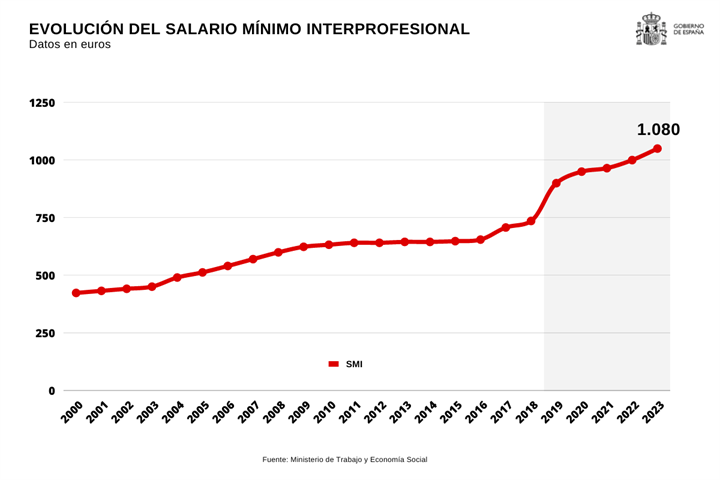 Pool Moncloa
Pool Moncloa
In the same vein, the Second Vice-President and Minister for Work and Social Economy, Yolanda Díaz, stressed that the government is fulfilling its commitments. It is fulfilling the mandate to raise the average take-home wage by 60%, in application of the European Social Charter, and is keeping its word to improve the lives of citizens. "The government is simply restoring labour and social protection rights. We are at the forefront in Europe in their defence. The firm vocation to improve wage equality through the minimum wage is very clear in Spain", she said.
Yolanda Díaz argued that raising the minimum wage is effective because it mobilises the economy. It has not destroyed jobs in any sector, in fact quite the contrary. It is the best tool for combating poverty and inequality at work and for advancing equal pay for men and women.
The two most precarious sectors in our country, Díaz pointed out, are women and young people, who are the two groups that will benefit most from the increase in the minimum wage. In this respect, the vice-president pointed out that we are one of the few countries that are closing the gender gap, and that "the best, most feminist tool to improve women's social rights is called the Minimum Interprofessional Wage".
Yolanda Díaz also maintained that raising the minimum wage has a key impact on child poverty, life expectancy and the mental health of citizens: "If you have a slightly better salary, you have fewer worries and a little more peace of mind to be able to pay the bills".
According to data from the Ministry of Labour, the increase will benefit two and a half million people. The Bank of Spain estimates that this represents 10% of the wage-earning population. The second vice-president added that it will have a positive effect on domestic demand and consumption, which could be allocated an increase of more than €3 billion.
Wage increases for all workers
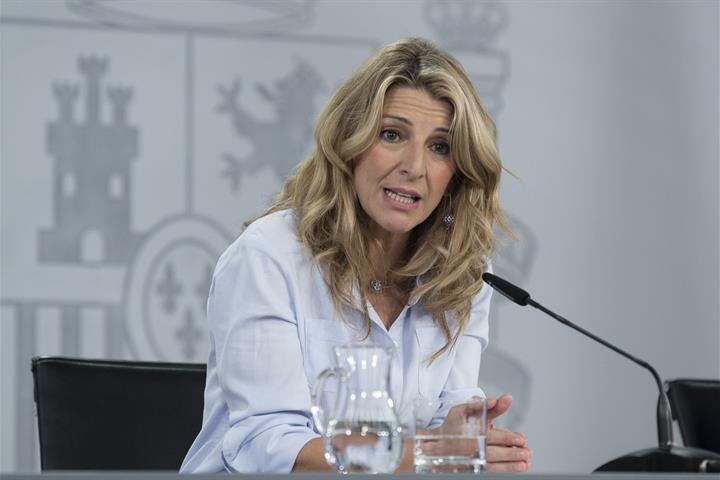 Pool Moncloa/Borja Puig de la Bellacasa
Pool Moncloa/Borja Puig de la Bellacasa
Yolanda Díaz thanked the social partners for their contribution to the agreement because "they never let down their country". Although the Spanish Confederation of Business Organisations (CEOE) was not at the table, it did make proposals in a deferred manner, aware that the loss of purchasing power must be compensated, she said.
In this context, the second vice-president made a new appeal to them, particularly to the CEOE, to sit down and negotiate a wage increase in collective agreements to compensate for the loss of wage income and workers' purchasing power. "We have complied by raising the minimum wage, but I believe that the social partners must now rise to the occasion and take the necessary compensation seriously", she stated.
"This is the government of the workers. We are implementing each and every policy to improve their lives. We are demonstrating this not only with the labour reform, but also with wage increases, which are sizeable. And we are speaking out strongly, and we will continue to do so, in defence of the rise in wages in Spain", she concluded.
Aid for Just Transition Areas
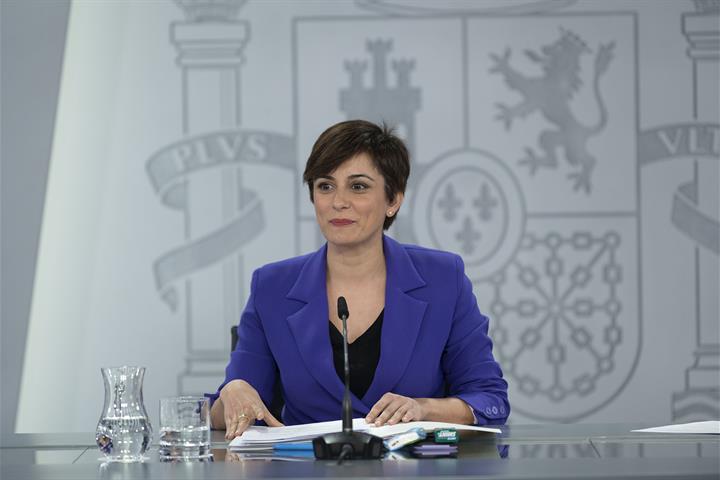 Pool Moncloa/Borja Puig de la Bellacasa
Pool Moncloa/Borja Puig de la Bellacasa
The Council of Ministers has earmarked €40 million to support business projects that generate employment and promote the development of just transition zones.
The government spokeswoman explained that these subsidies are intended to attract investment to areas affected by the closure of coal mining, coal-fired power stations and nuclear power stations. They represent "the transformation towards a more sustainable model of our industry" from an economic perspective, and they are a more competitive model to curb climate change.
The measure, said Isabel Rodríguez, is part of the joint and global strategy of ecological transition and represents a commitment to accompany industry. In this regard, the executive will present this week in Asturias the Strategic Plan, which counts on the recovery funds.
Recognition of Carlos Saura
The government has awarded the Gran Cruz de la Orden Civil de Alfonso X el Sabio posthumously to the recently deceased filmmaker, Carlos Saura.
The spokesperson said that the government wanted to pay tribute to his legacy and his long years of work contributing to culture in Spain. She also recalled that he was already deserving of the other recognitions he fortunately enjoyed during his lifetime from Spanish society and the institutions of our country, such as the National Cinematography Award, the Gold Medal for Merit in Fine Arts and the Gold Medal of the Academy of Cinematographic Arts and Sciences.
Report on the National Health System
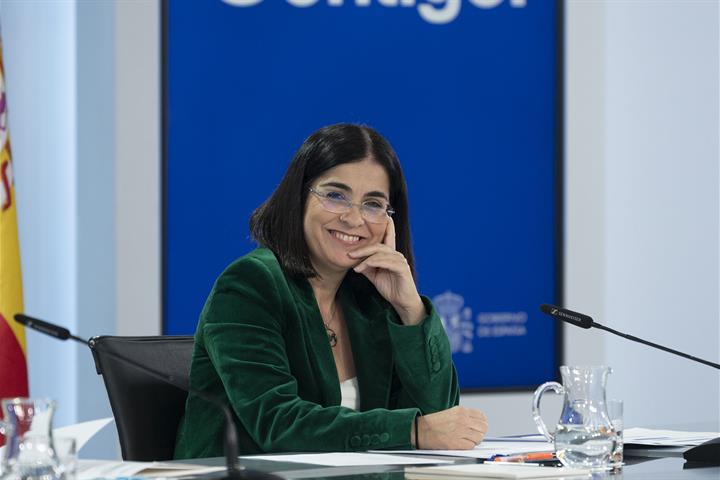 Pool Moncloa/Borja Puig de la Bellacasa
Pool Moncloa/Borja Puig de la Bellacasa
The Council of Ministers has analysed the report presented by the Minister for Health, Carolina Darias, on the actions carried out to transform the National Health System (NHS) and respond to health challenges.
Carolina Darias stated that the government is working to rebuild public health, to reverse "the neoliberal cuts that led to a real dismantling of the welfare state", and to carry out structural reforms that will make it possible to confront present and future challenges.
The minister reminded the audience that although health competences are transferred to the autonomous communities, health is also the responsibility of the executive because "improving people's lives is the raison d'être of this government of the people".
This is why, he continued, he is putting on the table actions, solutions, resources and concrete actions to expand and strengthen the capacities of the NHS. Specifically, the Recovery, Transformation and Resilience Plan is enabling "unprecedented reforms and investments" to make the NHS more flexible, stronger and more resilient and adaptable to health needs at all times.
Strengthening primary care
Primary care is the backbone of the National Health System, which is why strengthening it is one of the most important challenges, Carolina Darias pointed out.
The minister reviewed the main actions carried out in this area, such as the Primary and Community Care Action Plan unanimously approved by the Interterritorial Council of the NHS and endowed with €1 billion, which includes the oral health plan and the digital transformation of the system. Soon, he announced, an infrastructure improvement plan will be launched to improve both the health centres and clinics and their diagnostic instruments.
Public health system reform
"One of the great lessons of the pandemic," Darias continued, "was the need to improve the public health system".
In this regard, the Public Health Strategy has been approved, the draft law creating the Public Health Agency has been submitted to Parliament, and a Royal Decree will soon be made public, which will regulate the current surveillance system to include not only communicable diseases but also others with high morbidity, such as cardiovascular diseases, cancer and diabetes.
Equity, universality and cohesion
In 2023, the minister announced, important actions will be implemented to consolidate equity, universality and cohesion in health care. Among them is the Plan for the Implementation of the Genomic Portfolio in the NHS, endowed with €100 million, which will allow for the genetic tests that are increasingly important for diagnosis to be carried out in health centres throughout the country. The Rare Diseases Plan, with a special focus on ALS, will also receive €70 million, of which €20 million will be for research.
The INVEAT Plan for investment in high-tech equipment is making it possible to renew or expand 851 pieces of equipment throughout Spain, thanks to almost the allocation of almost €800 million. "It will allow for a before and an after in diagnostic capacity," Darias said.
In addition, the Proton Therapy Plan, the outcome of an agreement with the Amancio Ortega Foundation, will mean that the NHS will go from having no proton therapy equipment to having ten machines, which will be essential for long-survival patients, especially among the paediatric population.
As for the Mental Health Plan, to which €100 million have been allocated, it has already enabled, among other actions, the launch of the 024 suicide hotline, which has received more than 80,000 calls in the first few months.
Strengthening the professional skills of health workers
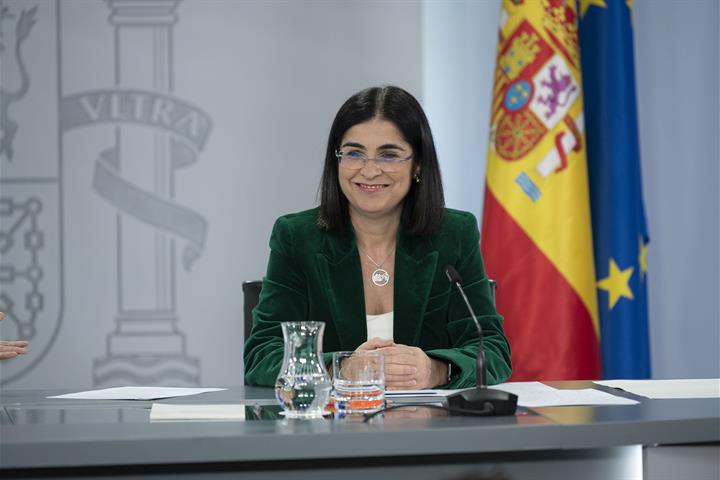 Pool Moncloa/Borja Puig de la Bellacasa
Pool Moncloa/Borja Puig de la Bellacasa
Regarding health professionals, the Minister for Health stressed that "our obligation is to care for those who care for us", defining them as "the most valuable asset of the NHS".
So far, a stabilisation process of more than 67,000 positions has been approved to put an end to temporary employment, new specialities have been created and its Framework Statute is being updated. A procedure for early retirement has also been set up and the resolution of the procedures for the recognition of EU and non-EU diplomas has been speeded up.
Furthermore, the healthcare offer of specialised training, which has grown by 40% since 2018, is being expanded, and the increase of up to 15% of places in public medical schools will be financed by the General State Budget. There are now fewer people completing medical degrees than there are specialist training places, whereas before 2018 the opposite was the case.
Recovery and advancement of rights
Last, the minister highlighted the recovery of rights such as the universal provision of medical care and access to assisted reproduction for single women, lesbians or bisexuals and transgender people with gestational capacity, and the creation of other new rights, such as the dignified right to die thanks to the Organic Law on the Regulation of Euthanasia.
Current Affairs
During her speech at the press conference following the Council of Ministers, the spokesperson defended the fact that the government's economic policy "is effective and is recognised by European institutions".
In this respect, Isabel Rodríguez indicated that the European Commission yesterday raised the growth forecasts for our country thanks to the strength of the labour market. Labour policy and industrial policy, among others, are consolidating Spain's growth. "Spain will be the fastest growing major European economy in 2023 and 2024, according to the Commission's forecasts, with growth higher than the European average and the Eurozone", she highlighted.
In her opinion, the executive is "facing the challenges of tomorrow and by laying the foundations of today we are anchoring our future".
Non official translation
More Info
- The Government of Spain raises the Minimum Interprofessional Wage to 1,000 euros (2022/02/22)
- The Government of Spain raises the Minimum Wage to 965 euros and extends ERTEs until 28 February (2021/09/28)
- Government agrees to extend minimum wage set at 950 euros per month (2020/12/29)
- Government raises minimum wage for 2019 to 900 euros (2018/12/21)




